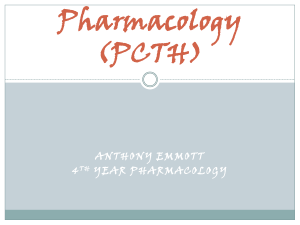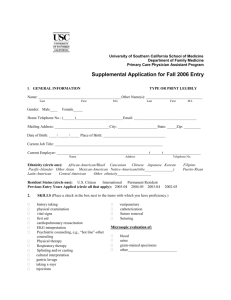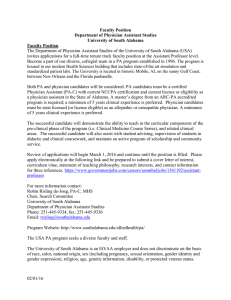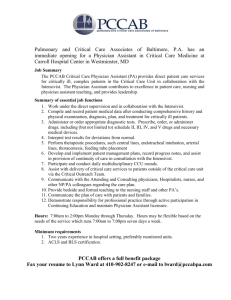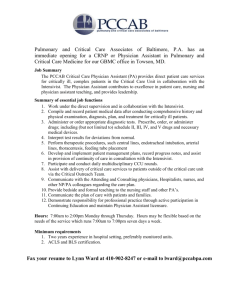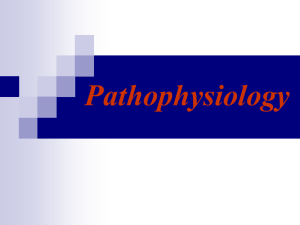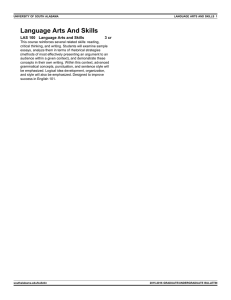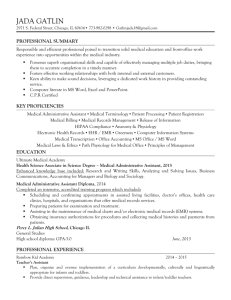Physician Assistant Studies PA 510L CM I Lab 1 cr
advertisement
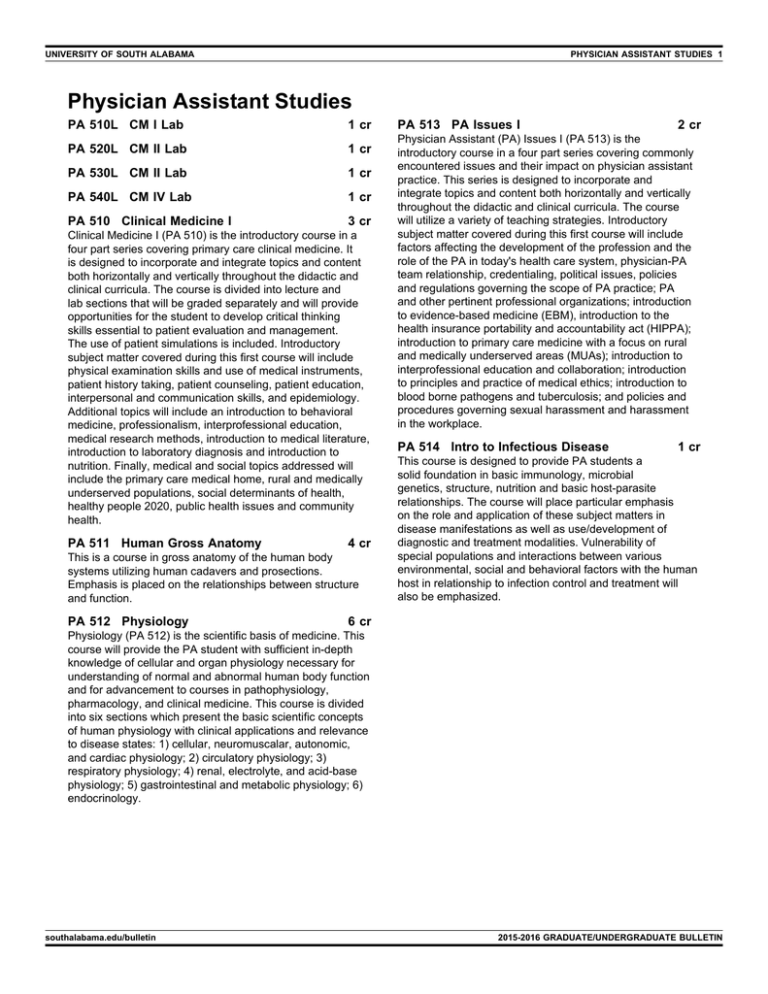
UNIVERSITY OF SOUTH ALABAMA PHYSICIAN ASSISTANT STUDIES 1 Physician Assistant Studies PA 510L CM I Lab 1 cr PA 520L CM II Lab 1 cr PA 530L CM II Lab 1 cr PA 540L CM IV Lab 1 cr PA 510 Clinical Medicine I 3 cr Clinical Medicine I (PA 510) is the introductory course in a four part series covering primary care clinical medicine. It is designed to incorporate and integrate topics and content both horizontally and vertically throughout the didactic and clinical curricula. The course is divided into lecture and lab sections that will be graded separately and will provide opportunities for the student to develop critical thinking skills essential to patient evaluation and management. The use of patient simulations is included. Introductory subject matter covered during this first course will include physical examination skills and use of medical instruments, patient history taking, patient counseling, patient education, interpersonal and communication skills, and epidemiology. Additional topics will include an introduction to behavioral medicine, professionalism, interprofessional education, medical research methods, introduction to medical literature, introduction to laboratory diagnosis and introduction to nutrition. Finally, medical and social topics addressed will include the primary care medical home, rural and medically underserved populations, social determinants of health, healthy people 2020, public health issues and community health. PA 511 Human Gross Anatomy 4 cr This is a course in gross anatomy of the human body systems utilizing human cadavers and prosections. Emphasis is placed on the relationships between structure and function. PA 512 Physiology PA 513 PA Issues I 2 cr Physician Assistant (PA) Issues I (PA 513) is the introductory course in a four part series covering commonly encountered issues and their impact on physician assistant practice. This series is designed to incorporate and integrate topics and content both horizontally and vertically throughout the didactic and clinical curricula. The course will utilize a variety of teaching strategies. Introductory subject matter covered during this first course will include factors affecting the development of the profession and the role of the PA in today's health care system, physician-PA team relationship, credentialing, political issues, policies and regulations governing the scope of PA practice; PA and other pertinent professional organizations; introduction to evidence-based medicine (EBM), introduction to the health insurance portability and accountability act (HIPPA); introduction to primary care medicine with a focus on rural and medically underserved areas (MUAs); introduction to interprofessional education and collaboration; introduction to principles and practice of medical ethics; introduction to blood borne pathogens and tuberculosis; and policies and procedures governing sexual harassment and harassment in the workplace. PA 514 Intro to Infectious Disease 1 cr This course is designed to provide PA students a solid foundation in basic immunology, microbial genetics, structure, nutrition and basic host-parasite relationships. The course will place particular emphasis on the role and application of these subject matters in disease manifestations as well as use/development of diagnostic and treatment modalities. Vulnerability of special populations and interactions between various environmental, social and behavioral factors with the human host in relationship to infection control and treatment will also be emphasized. 6 cr Physiology (PA 512) is the scientific basis of medicine. This course will provide the PA student with sufficient in-depth knowledge of cellular and organ physiology necessary for understanding of normal and abnormal human body function and for advancement to courses in pathophysiology, pharmacology, and clinical medicine. This course is divided into six sections which present the basic scientific concepts of human physiology with clinical applications and relevance to disease states: 1) cellular, neuromuscalar, autonomic, and cardiac physiology; 2) circulatory physiology; 3) respiratory physiology; 4) renal, electrolyte, and acid-base physiology; 5) gastrointestinal and metabolic physiology; 6) endocrinology. southalabama.edu/bulletin 2015-2016 GRADUATE/UNDERGRADUATE BULLETIN UNIVERSITY OF SOUTH ALABAMA PA 520 Clinical Medicine II PHYSICIAN ASSISTANT STUDIES 2 6 cr Clinical Medicine II (PA 520) is the second course in a four part series covering primary care clinical medicine and surgery topics. It is designed to incorporate and integrate topics and content both horizontally and vertically throughout the didactic and clinical curricula. The course is divided into lecture and lab sections that will be graded separately and will provide opportunities for the student to develop critical thinking skills essential to patient evaluation and management. The use of standardized patients, patient simulations and clinical experiences are included. Topics will include a continuation of physical examination skills, patient history taking, patient counseling, patient education, epidemiology, history of the PA Profession, professionalism, interpersonal and communication skills, interprofessional education, medical research methods, and researching medical literature, the primary care medical home, rural and medically underserved populations, social determinants of health, healthy people 2020, public health issues, and community health care. Specific topics covered in PA 520 include dermatology, ophthalmology, ENT, cardiovascular medicine, EKG, pulmonary medicine, nephrology, and GU medicine. Imbedded in this course will be topics in infectious disease and diagnostic data that will align with the subject matter covered during this semester. PA 521 Pathophysiology I 4 cr Pathophysiology I (PA 521) is the first course in a threepart series that covers the alterations in normal physiology that occur in human disease states. This course will provide the PA student with sufficient in-depth knowledge of pathophysiology necessary for understanding of abnormal human body function and for advancement to subsequent courses in pathophysiology, pharmacology, and clinical medicine. Topics will include an overview of cellular pathophysiology, followed by specific topics that align with the organization of the clinical medicine series: cardiovascular pathophysiology, EKG, pulmonary pathophysiology, and renal/GU pathophysiology. PA 522 Pharmacology I 4 cr Pharmacology I (PA 522) is the first course in a three-part series that covers the basic scientific concepts of drug classification, mechanism of action, toxicity, and clinical use of drugs. Introductory topics will include the laws and regulations governing the use of pharmaceuticals, prescriptive practices, basic science and properties of drug molecules, drug interactions, and clinical pharmacology of the autonomic nervous system. Specific topics will align with the organization of the clinical medicine series: cardiovascular drugs, pulmonary drugs, drug therapy of renal and genitourinary disease. southalabama.edu/bulletin PA 523 Diag Data and Interp I 2 cr (Previously PA 524) Interpretation of Diagnostic Data and Studies I, will introduce students to basic concepts of laboratory medicine including different methods of sample gathering and transport, basic phlebotomy, interpretation of blood counts and analysis of the differential blood counts, coagulation studies and anticoagulant monitoring, interpretation of metabolic panels, evaluating electrolyte abnormalities, and ordering and interpreting bacterial culture and susceptibilities. The course will focus on and correlate with laboratory assays and procedures taught during Clinical Medicine II. Syllabi and tentative schedules of lectures for the course are attached. PA 525 PA Issues II 2 cr Physician Assistant (PA) Issues II (PA 525) is the second in a four part series covering commonly encountered issues and their impact on physician assistant practice. This series is designed to incorporate and integrate topics and content both horizontally and vertically throughout the didactic and clinical curricula. The course will utilize a variety of teaching strategies. Subject matter covered during this second course will include factors affecting diversity and inclusion; cultural competence; health care delivery systems; workforce shortage; health disparities; health literacy; public health, primary care medicine with a focus on veterans, rural and medically underserved medicine, evidence-based medicine, professionalism, social determinants of health, health promotion, disease prevention, health beliefs and patient expectations. PA 530 Clinical Medicine III 6 cr Clinical Medicine III (PA 530) is the third course in a four part series covering primary care clinical medicine and surgery topics. It is designed to incorporate and integrate topics and content both horizontally and vertically throughout the didactic and clinical curricula. The course is divided into lecture and lab sections that will be graded separately and will provide opportunities for the student to develop critical thinking skills essential to patient evaluation and management. The use of standardized patients, patient simulations and clinical experiences are included. Topics will include a continuation of complete and focused physical examination skills, patient history taking, patient counseling, patient education, epidemiology, normal and abnormal development, history of the PA Profession, professionalism, interpersonal and communication skills, interprofessional education, medical research methods, and researching medical literature, the primary care medical home, rural and medically underserved populations, social determinants of health, healthy people 2020, public health issues, and community health care. Specific topics covered in PA 530 include neurology, rheumatology, hematology/ oncology, orthopedic medicine, gastrointestinal medicine, and psychiatric/behavioral medicine. Included in this course will be topics in infectious disease and diagnostic data that will align with the subject matter covered during this semester. 2015-2016 GRADUATE/UNDERGRADUATE BULLETIN UNIVERSITY OF SOUTH ALABAMA PA 531 Pathophysiology II PHYSICIAN ASSISTANT STUDIES 3 4 cr Pathophysiology II (PA 531) is the second course in a threepart series that covers the alterations in normal physiology that occur in human disease states. This course will provide the PA student with sufficient in-depth knowledge of pathophysiology necessary for the understanding of abnormal human body function and for advancement to subsequent courses in pathophysiology, pharmacology, and clinical medicine. Topics will align with the subject matter in Clinical Medicine II (PA 530): neurology, rheumatology, endocrinology, hematology, oncology, gastrointestinal, and psychiatric disorders. PA 532 Pharmacology II 4 cr This course is the second of a proposed three part pharmacology series that used to be taught in two sections during the spring and summer semesters as PA 532 and PA 542. The course will continue to cover the basic scientific concepts of drug classification, mechanism of action, toxicity, and clinical use of drugs. Other topics will include drug interaction and the properties of drug molecules. Specific topics will align with the organization of the clinical medicine series. PA 533 Diag Data & Interp II 2 cr Interpretation of Diagnostic Data and Studies II, will focus on ordering and interpretation of laboratory tests and imaging studies associated with diseases of the urinary tract system including basic and advanced urinalysis and their interpretation, laboratory tests and imaging studies associated with diseases of the gastrointestinal tract to include liver, pancreas, small intestine and colorectal regions, basic and advanced immunohematology and imaging to investigate autoimmune disorders, and advanced genetic testing and procedures. This course will advance the students knowledge of laboratory medicine and will focus on those laboratory assays relevant to the topic covered in Clinical Medicine III. PA 534 PA Issues III 2 cr Physician Assistant (PA) Issues III (PA 534) is the third in a four part series covering commonly encountered issues and their impact on physician assistant practice. This series is designed to incorporate and integrate topics and content both horizontally and vertically throughout the didactic and clinical curricula. The course will utilize a variety of teaching strategies. Introductory subject matter covered during this third course will include topics on coding and billing, medical documentation, spirituality and health, epidemiology, transition from didactic to clinical year, health care cost, Advanced Directives End of Life Issues, interprofessional team-based patient-centered care, healthcare in various clinical settings (homelessness, migrant, correctiopnal, inner city), and primary care medicine with a focus on veterans, rural and medically underserved medicine, evidence-based medicine, medical documentation and professionalism. southalabama.edu/bulletin PA 540 Clinical Medicine IV 6 cr Clinical Medicine IV (PA 540) is the final course in a four part series covering primary care clinical medicine and surgery topics. It is designed to incorporate and integrate topics and content both horizontally and vertically throughout the didactic and clinical curricula. The course is divided into lecture and lab sections that will be graded separately and will provide opportunities for the student to develop critical thinking skills essential to patient evaluation and management. The use of standardized patients, patient simulations and clinical experiences are included. Topics will include a continuation of complete and focused physical examination skills, patient history taking, patient counseling, patient education, interpersonal and communication skills, epidemiology, normal and abnormal development, history of the PA Profession, professionalism, interprofessional education, medical research methods, and researching medical literature, the primary care medical home, rural and medically underserved populations, social determinants of health, healthy people 2020, public health issues, and community health care. Specific topics covered in PA 540 include geriatric medicine, pediatric medicine, surgery, OB/ GYN medicine, emergency medicine, ACLS, and clinical year transition. Included in this course will be topics in infectious disease and diagnostic data that will align with the subject matter covered during this semester. PA 541 Pathophysiology III 2 cr This course is the third of three sections of pathophysiology that used to be taught during the fall semester as a single course PA 523. The course will provide students with an understanding of abnormal body functions including an overview of cellular pathophysiology followed by specific topics that align with the organization of the clinical medicine series. PA 542 Pharmacology III 2 cr This course is the third of a proposed three part pharmacology series that used to be taught in two sections during the spring and summer semesters as PA 532 and PA 542. The course will continue to cover the basic scientific concepts of drug classification, mechanism of action, toxicity, clinical use of drugs, drug interaction and the properties of drug molecules. Specific topics will align with the organization of the clinical medicine series. 2015-2016 GRADUATE/UNDERGRADUATE BULLETIN UNIVERSITY OF SOUTH ALABAMA PA 543 PA Issues IV PHYSICIAN ASSISTANT STUDIES 4 2 cr Physician Assistant (PA) Issues IV (PA 543) is the final course in a four part series covering commonly encountered issues and their impact on physician assistant practice. This series is designed to incorporate and integrate topics and content both horizontally and vertically throughout the didactic and clinical curricula. The course will utilize a variety of teaching strategies. Introductory subject matter covered during this final course series will introduce new topics and re-visit prior topics of discussion in other PA Issues courses. Topics will include interpersonal and communication skills, personal bias and stereotyping, patient compliance and health outcomes, violence identification and prevention, response to illness, injury and stress, patient safety, prevention of medical errors, palliative and rehabilitative care/death/dying and loss, patient education and counseling, and primary care medicine with a focus on veterans, rural and medically underserved medicine, evidence-based medicine, medical documentation and professionalism. PA 544 Diagn Data and Interp III 2 cr (Previously PA 541) Interpretation of Diagnostic Data and Studies III, will introduce students to basic radiology concepts by teaching fundamentals of radiology, basic imaging techniques (ultrasound, vascular imaging, advanced imaging techniques (CT Scan and MRI with and without contrast), and PET scan. The course will hone student knowledge of all diagnostic modalities through intensive case-based approach to the interpretation of laboratory assays. PA 550 Internal Medicine Preceptorshp 4 cr The student is assigned to a clinical setting, often in the inpatient setting, to obtain knowledge, skills and attitudinal/behavioral professional components pertaining to general internal medicine. These competencies are to be obtained while engaging in all aspects of patient care through: the medical interview, history and physical exam, critical thinking, knowledge base, diagnosis and treatment plan, patient education, as well as appropriate health maintenance and disease prevention measures. PA 555 Psychiatry Preceptorship 4 cr The student is assigned to a clinical setting, often in the inpatient setting, to obtain knowledge, skills and attitudinal/ behavioral professional components pertaining to general internal medicine. These competencies are to be obtained while engaging in all aspects of patient care through: the medical interview, history and physical exam, critical thinking, knowledge base, diagnosis and treatment plan, and patient education. Students will also be expected to interact on an interdisciplinary team to provide care to patients with Psychiatric needs, including awareness of social and community services. southalabama.edu/bulletin PA 560 Pediatrics Preceptorship 8 cr The student is assigned to a pediatric setting in order to obtain knowledge, skills and attitudinal/behavioral professional components pertaining to general pediatric medicine. These competencies are to be obtained while engaging in all aspects of patient care through: the medical interview, history and physical exam, critical thinking, knowledge base, diagnosis and treatment plan, patient and family education, anticipatory-guidance, as well as appropriate health maintenance and disease prevention measures. PA 570 Primary Care-Family Pract Prcp 8 cr The student is assigned to a primary care setting in order to obtain knowledge, skills and attitudinal/behavioral professional components pertaining to general family practice medicine across the life span. These competencies are to be obtained while engaging in all aspects of patient care through: the medical interview, history and physical exam, critical thinking, knowledge base, diagnosis and treatment plan, patient education, appropriate health maintenance and disease prevention measures. PA 580 General Surgery Preceptorship 4 cr The student is assigned to a hospital-surgical setting in order to gain exposure to all realms of the general surgery experience. These experiences are to include: pre-operative, intra-operative, and post-operative care. Furthermore, students are expected to further develop patient care skills through: the medical interview, history and physical examination, critical thinking, enhancement of medical knowledge, patient and family counseling, and understanding the role of a PA within the hospital team. PA 590 OB-GYN Preceptorship 4 cr The student is assigned to hospital in-patient and outpatient ambulatory care settings in order to gain exposure to all realms of the women's health across the life span. These experiences are to include: pre-natal, post-natal, pre-operative, intra-operative, post-operative care, annual wellness exam, and emergent care exams. Furthermore, students are expected to further develop patient care skills through: the medical interview, history and physical examination, critical thinking, enhancement of medical knowledge, patient and family counseling, and understanding the role of a PA within the hospital team. PA 591 Emergency Medicine Preceptor 4 cr The student is assigned to an emergency department setting in order to gain exposure to patients requiring critical, emergent and non-emergent care. Furthermore, students are expected to further develop patient care skills through: the medical interview, history and physical examination, critical thinking, enhancement of medical knowledge, patient and family counseling, and understanding the role of a PA within the emergency department team. 2015-2016 GRADUATE/UNDERGRADUATE BULLETIN UNIVERSITY OF SOUTH ALABAMA PA 592 Elective Clinical Precept I PHYSICIAN ASSISTANT STUDIES 5 4 cr The student will choose from a variety of available elective rotations in order to engage in all aspects of patient care including: the medical interview, history and physical exam, critical thinking, knowledge base, diagnosis and treatment plan, patient education, appropriate health maintenance and disease prevention measures. The goal of elective rotations is to provide the student the opportunity to explore areas of interest for further employment or increase knowledge in areas of weakness. PA 593 Elective Preceptorship II 8 cr The student will choose from a variety of available elective rotations in order to engage in all aspects of patient care including: the medical interview, history and physical exam, critical thinking, knowledge base, diagnosis and treatment plan, patient education, appropriate health maintenance and disease prevention measures. The goal of elective rotations is to provide the student the opportunity to explore areas of interest for further employment or increase knowledge in areas of weakness. PA 594 Research Presentation 1 cr This course is designed to teach students how to build research skills, prepare manuscripts, and advance professional development. During the third semester of preclinical work, the students are given a briefing regarding the research project. The project is not due until the last semester of clinical work. The student selects a topic under the direction of a faculty mentor. Once a topic is chosen, an in-depth review of the literature is conducted by the student. The project can be formatted as a case report, comprehensive review, or a research report. PA 595 Summative Evaluation 3 cr PA 595 is designed to evaluate student learning at the end of the 27 month PA training program. The assessments used in this course will help determine the level at which students achieved the expectations for their learning as prescribed and to identify instructional areas that may need additional attention. The summative assessments include: 1) comprehensive examination, 2) OSCE with standardized patient, 3) on-line board review and 4) Capstone Project. A comprehensive written examination will be administered as a final evaluation of the student's progress. This test is also designed to prepare the graduate for the NCCPA exam. southalabama.edu/bulletin 2015-2016 GRADUATE/UNDERGRADUATE BULLETIN
